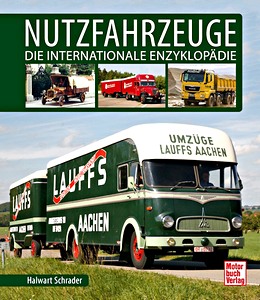Nutzfahrzeuge - Die internationale Enzyklopädie
Warum hatten alle Lastwagen früher Vollgummireifen? Aus welchem Grund betrieb Büssing eine eigene Omnibuslinie? Wann wurde der letzte Dampf-Lkw gebaut? Welches Kommunalfahrzeug hiess der "elektrische Berliner"?
In dieser Enzyklopädie der internationalen Nutzfahrzeuggeschichte finden Sie Informationen, Daten, Erklärungen sowie Antworten auf tausendundeine Frage.

Halwart Schrader behandelt alle bedeutenden Fahrzeugmarken der Welt, und zwar nicht nur Hersteller von Lastwagen, Traktoren, Omnibussen, etc., sondern auch Produzenten von Anhängern, Aufbauten, Motoren, Achsen und Getrieben.

Details
| Autor: | Halwart Schrader |
|---|---|
| Ausführung: | 380 Seiten, 26.5 x 23 cm, gebunden |
| Abbildungen: | 700 farbige und s/w-Abbildungen |
| Sprache: | Deutsch |
| Verlag: | Motorbuch Verlag (D, 2018) |
| ISBN: | 9783613040793 |

Nutzfahrzeuge - Die internationale Enzyklopädie
Sprache: Deutsch
Preis, Verfügbarkeit und Bewertungen auf Amazon ansehen
Kaufen bei Amazon DE





